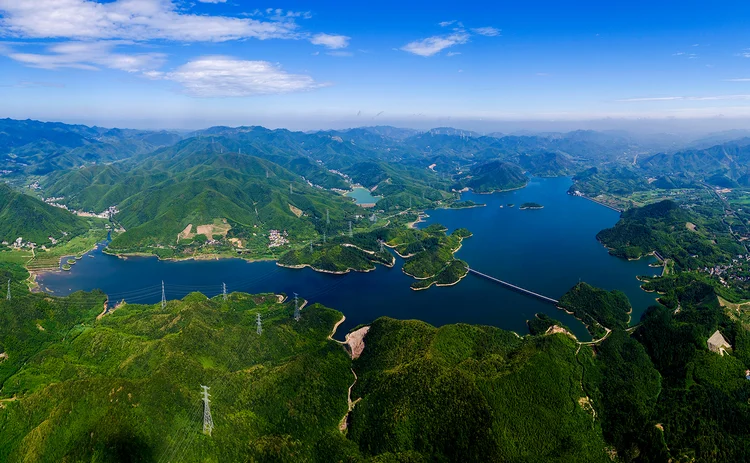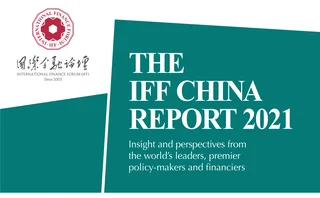
New bridges for green finance


The Fifth Plenary Session of the 19th Central Committee of the Communist Party of China (CPC) in October 2020 proposed a number of initiatives aimed at sustainable development, including a green transformation of the economic environment and the promotion of low-carbon development.
Finance is an important support mechanism for economic development and growth. Building the green financial system and increasing the supply of green finance are not only key measures to implement the proposals of the 19th National Congress of the CPC, but also an unavoidable requirement for achieving high-quality economic and social development.

China Energy Conservation and Environmental Protec-tion Group (CECEP) is the only industrial group among China’s state-owned key enterprises that focuses on energy conservation and environmental protection. CECEP’s total assets are close to CNY200 billion, and its annual contribution to operating income has reached about CNY50 billion. The enterprise has completed more than 300 energy-saving and environmental protection projects nationwide, with a renewable energy installed capacity of 1.28 billion gigawatts.
CECEP has also used green asset securitisation tools to issue more than CNY110 billion of bonds in its green industry sectors – such as clean energy, energy-saving services, solid waste treatment – and new materials. It also aims to build the first brand of domestic green industry funds.
In July 2020, CECEP established the National Green Development Fund in co-operation with local governments, financial institutions and other state-owned key enterprises to guide social capital, implement pollution control and ecological restoration projects, and provide systemic industrial support for solving ecological and environmental problems to achieve green, sustainable and high-quality economic development.
Promoting green finance and sustainable development requires funds, talent, technology and other resources
Three lessons
CECEP has accumulated much experience in the field of green finance. There are three highlights.
First, improving the system and actively building new bridges for green finance and services for green industries. In practice, CECEP adheres to the integration of industry and finance, and the integrated green development service system centred on the green financial policy research system, green financial product system, green technology research, development and project construction operation and maintenance system, and established green financial services. The consulting firms of CECEP have carried out extensive research on green financial systems and created China’s first definition and classification of green bonds.
Second, actively seeking new ways for green finance to support green industries through innovation. CECEP creatively uses funds from international financial organisations to change the traditional decentralised and single project model. It has effectively mobilised social capital to participate in the fight against air pollution in the Jingjinji Metropolitan Region of Beijing–Tianjin–Hebei.
The CECEP Asian Development Bank Fund has promoted the implementation of industrial waste heat, coal retirement, energy conservation and environmental protection projects in production areas and other projects. The total investment amount is about CNY1.2 billion and it is expected to reduce coal consumption by nearly 370,000 tonnes per year. On one hand, it helps local residents to achieve clean heating; on the other hand, it promotes enterprises to strengthen energy-saving and environmental protection measures.
Third, extensively co-operating to actively promote the development of green finance and green industries at home and abroad. At present, CECEP has co-operated with more than 30 provinces and cities to formulate the Green Finance Development Plan, through the establishment of green industry funds, green project identification and evaluation and promoting local green financial development.
CECEP is the main force in major national strategic deployments, such as the protection of the Yangtze River, the construction of the Xiong’an New Area, and the environmental governance of the Jingjinji Metropolitan Region. Now CECEP is actively participating in the governance of the Yellow River Basin, where it is certain to become an important force in promoting ecological protection and high-quality development.
Promoting green finance and sustainable development requires funds, talent, technology and other resources. It also requires the joint participation and efforts of governments, financial institutions and enterprises, and improvements in policy mechanisms, standards systems and international co-operation. Green development and green finance should go hand in hand. CECEP is willing to work with everyone to promote green finance to a new level, and make new contributions to promoting global sustainable development and building a community with a shared future for mankind.
Only users who have a paid subscription or are part of a corporate subscription are able to print or copy content.
To access these options, along with all other subscription benefits, please contact info@centralbanking.com or view our subscription options here: http://subscriptions.centralbanking.com/subscribe
You are currently unable to print this content. Please contact info@centralbanking.com to find out more.
You are currently unable to copy this content. Please contact info@centralbanking.com to find out more.
Copyright Infopro Digital Limited. All rights reserved.
As outlined in our terms and conditions, https://www.infopro-digital.com/terms-and-conditions/subscriptions/ (point 2.4), printing is limited to a single copy.
If you would like to purchase additional rights please email info@centralbanking.com
Copyright Infopro Digital Limited. All rights reserved.
You may share this content using our article tools. As outlined in our terms and conditions, https://www.infopro-digital.com/terms-and-conditions/subscriptions/ (clause 2.4), an Authorised User may only make one copy of the materials for their own personal use. You must also comply with the restrictions in clause 2.5.
If you would like to purchase additional rights please email info@centralbanking.com







